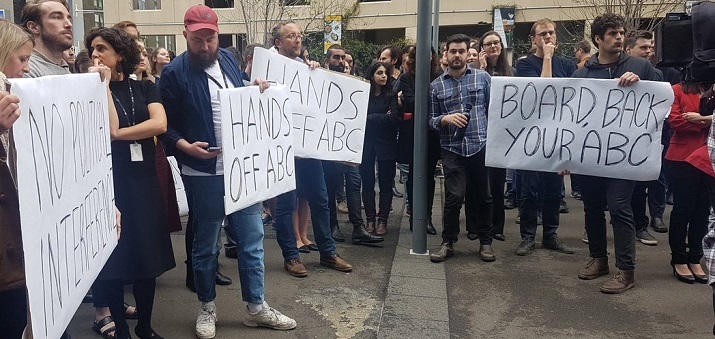MEAA statement to the inquiry into political interference in the ABC

Hundreds of ABC staff rally at the corporation's headquarters in Ultimo, Sydney, on September 26 2018 following reports that ABC chair Justin Milne told former managing director Michelle Guthrie to sack a presenter.
Statement by MEAA chief executive Paul Murphy to a public hearing of the Senate Environment and Communications References Committee as part of its inquiry into allegations of political interference in the Australian Broadcasting Corporation (ABC) - in Sydney, Tuesday March 5 2019.
MEAA expressed grave concerns with the conduct of the former ABC chair, Mr Milne, at the time his views concerning senior ABC editorial staff were publicly aired, shortly before his and Ms Guthrie's departure from the corporation. MEAA and its members abhor selective and/or politically motivated interventions by senior ABC personnel. We are dismayed by members of the political class continually undermining the ABC by sniping, carping and punishing the ABC, and by encouraging dissent towards the corporation, ordering meritless inquiries, cutting funds and, on occasion, stacking its board. For the record, MEAA submits that complaints concerning editorial staff or perceived institutional bias should be aired and considered in an orderly and dispassionate manner where the principles of procedural fairness are observed. There should be no room for senior ABC officers to prosecute complaints outside of such processes.
In our submission, we didn't seek to further canvass the events of September last year. We believe that this inquiry should focus on the systems that enabled those events to occur and on measures to ensure that board selection processes are sound and are not polluted by political interference. We concentrated our comments on terms of reference (c), (d) and (e). For the reasons set out in our submission, we make a total of 12 recommendations, and those are in three main areas: firstly, strengthening the independent selection process for board positions, removing political considerations from them and making them more transparent; secondly, replacing ad hoc and seemingly endless efficiency reviews with set, fixed term reviews based on consistent criteria and introducing independent external advice to guide triennial funding decisions; and, thirdly, reviewing the existing internal complaints handling processes.
On the first point around board appointments, we believe the initiative to establish an independent selection process some years ago for the ABC board was a good one, reflecting the need for the public to have confidence that board members would be selected based on merit and be capable of defending the independence and integrity of their public broadcaster. Multiple recent examples of the minister bypassing that process have, in our submission, produced a board not best fit to fulfil its duties. The perception of political favouritism in any appointment undermines public confidence, and, to be honest, the perception we have is that the minister of the day views the independent selection process as little more than an obstacle course to be overcome before making the appointment that they desire. In our submission, legislation should be amended so that no future appointments can be made outside of proper consideration and recommendation by the independent nomination panel.
We also make recommendations regarding board composition, specifically to extend the ban on former political officeholders being appointed to the board and to bar them from appointment to the independent nomination panel. We also recommend specifying that at least half the board should have experience in journalism or broadcasting, and for the creation also of an additional staff elected board position.
On funding, we note that since 2014 the ABC has faced funding cuts of more than $350 million and the resulting loss of hundreds of jobs. On one analysis, referred to in our submission, Australia invests 34 per cent less per person in public broadcasting than is the average figure for comparable democracies. Our submission notes that the ABC has been subject to no less than 16 efficiency reviews in the last 20 years. These reviews are often perceived as being driven by political considerations.
No-one argues the ABC should not be subject to efficiency reviews. Like all public institutions, it must be accountable for the use of public money. But reviews should be on a regular cycle, rather than being announced ad hoc, and should be conducted on consistent and transparent criteria. With regard to triennial funding, in our submission the engagement of independent advisers to assist government in assessing appropriate funding levels would be of great benefit.
And finally, in relation to the complaints processes, we have fielded several complaints from ABC personnel about the manner in which the ABC's Audience and Consumer Affairs unit deals with complaints. The ACA fielded 26,850 complaints in 2017. It examines all manner of complaints, from subtitling errors to claims of bias in reporting. Of those complaints, 120 were upheld in 2017. On occasion, it receives multiple complaints from business and community organisations that allege an ingrained bias against their interests. A number of cases where such bias has been alleged have seen the ACA arrive at preliminary and sometimes final findings about bias without first providing allegations to the editorial staff member concerned. MEAA submits that the ABC's complaints system must inform relevant staff of editorial complaints without fail. In addition, the person whose behaviour is complained about must have the ability to respond directly to the allegation before a preliminary or final decision is made. Anything less is a denial of natural justice and actually serves to undermine the integrity of the complaints process itself.
See Hansard for the complete statement made to the inquiry's public hearing.